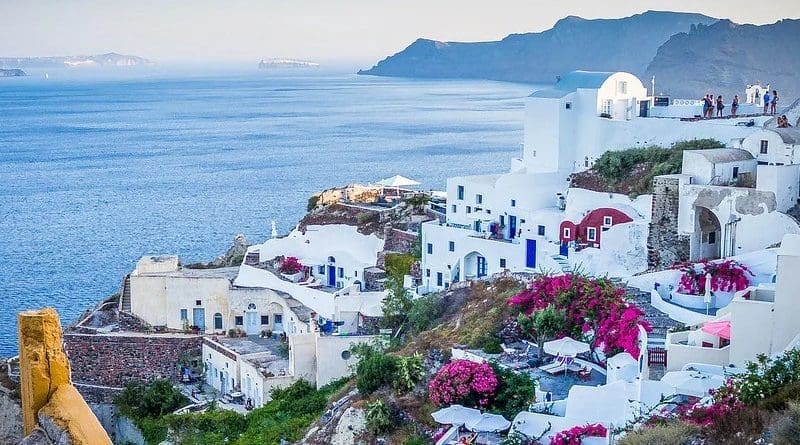Greece Reopens To Tourists With Big Fanfare
By Stavros Malichudis
Greece officially reopened for international tourism on May 14 with a campaign targeting foreign visitors, titled “All you want is Greece”, presented by Tourism Minister Harry Theocharis in front of the backdrop of the Temple of Poseidon on Cape Sounio one day before.
The campaign is the biggest promotional programme that the Greek National Tourism Organization, GNTO, has organised in a decade, and features five videos, as well as a website (visitgreece.com) which will be launched in the coming days.
Having returned from foreign tours promoting Greece as a safe tourist destination for the summer, Theocharis said all visitors to the country would need to present a certificate of vaccination against COVID-19, a recent negative PCR test, or a document certifying recent recovery from the virus. Tourists will also need to have prepared a form stating where they will be staying in Greece, and for how long.
Although the videos focus on the promotion of the country’s natural landscapes, the minister said this year’s real challenge was not promoting Greece’s natural beauty but “safety” in the context of COVID-19 and health.
He insisted the Greek government had taken all necessary measures in that respect, and talked of last year’s summer as a good example, when he said: “Greek tourism won a difficult bet. We opened with strict conditions and welcomed visitors safely to the country.”
In reality, the efficiency and success of last year’s summer season, as well as this year’s prospects, are widely questioned both in and outside the country.
In a recent interview the minister gave to BBC radio’s HardTalk show, Theocharis faced tough questions about the country reopening to tourists while numbers of vaccinations remain fairly low; so far, 13 per cent of the Greek population have received both doses of the vaccine.
Many Greeks also saw last year’s unregulated opening to tourists as the cause of a steep rise in cases in the autumn. Greece now aims to vaccinate all the tourist-popular islands, except Crete, which, due to its large size and population, is following the national strategy.
While Greece opens up to tourism, tourists themselves have yet to come to Greece. In Athens, some hotels have not yet opened, with many owners doubting whether it is in their interest to open this year or not.
In the villages of Platanias and Maleme on Crete, which largely serve tourists from the UK, BIRN spotted empty streets, cafes and restaurants and beach bars.
Yannis Orestis Papadimitriou, a reporter covering Greece for Britain’s Daily Telegraph, told BIRN: “Professionals in tourism have told me that bookings in general are coming in at the last moment this year, and that the tourist season is expected to kick off no sooner than late June.”
“The UK’s amber classification of Greece has already led to cancelled bookings. This is important since the UK is Greece’s second largest country of origin for tourism, but professionals believe they will bounce back, though it seems unlikely they will get anywhere close to the numbers of 2019,” he said.
“The one thing everyone agrees on that any notion of ‘success’ for this season relies first and foremost on the rates of vaccination” he added.
Theocharis refused to set a target for this year’s tourism figures and only insisted Greece will do “better than last year”.
Tourism normally accounts for about a fifth of the domestic economy and employs one in five workers. Last year, it earned the country around 4 billion euros, far less than the 18 billion euros earned in 2019.
Sector officials say Greece plans to restore 50 per cent of the travel activity recorded in 2019, and host about 15 million tourists.
But until last week, according to Konstantina Svinou, president of the Research Institute for Tourism, bookings across the country were equal to just 20 per cent of the 2019 figure, with the majority of them made for July.
Greece has recorded over 11,000 deaths due to COVID-19. On May 13, 2,167 new cases and 55 more deaths were recorded. While tourism rivals like Spain, Italy and Portugal have vaccinated a significant percentage of their older age groups, in Greece just over 62-63 per cent of people over 70 have been vaccinated.
Besides the campaign aimed at luring foreign tourists back to Greece, a separate campaign will be aired in the coming weeks designed to combat rising scepticism about vaccines, and persuade people in older age groups to get vaccinated.

